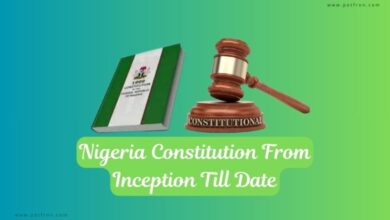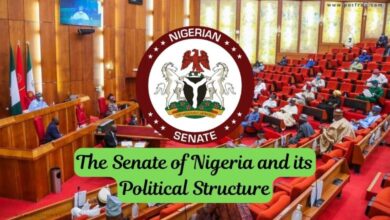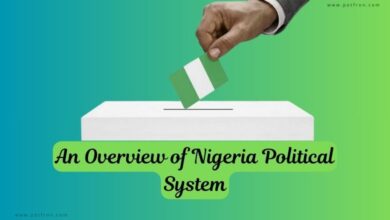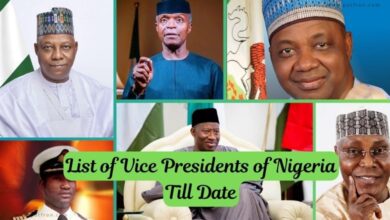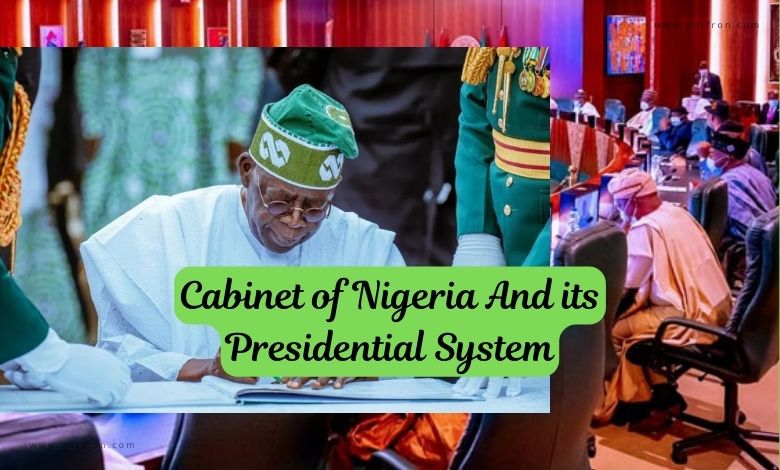
The cabinet of Nigeria and the governance of the Federal Republic of Nigeria operates under a presidential system, where the President serves as both the Head of State and the Head of Government. The presidential cabinet is central to the administration, and plays major role in implementing government policies, advising the President, and ensuring the smooth operation of the federal government.
The cabinet of ministers of the Federal Republic of Nigeria and is part of the executive branch of the Government of Nigeria is also known as The Federal Executive Council (FEC).
In accordance with the Ministers’ Statutory Powers and Duties Act, the council’s role is to serve as an advisory body to the President of Nigeria, who serves as the FEC’s chairman. The President is responsible for appointing members of the cabinet and can also dismiss them. The cabinet of Nigeria consists of 24 Federal Ministries, each responsible for some aspect of providing government services, as well as a number of parastatals (government-owned corporations).
The Nigerian cabinet consists of the Vice President, Ministers, and a few other key officials appointed by the President.
Related: List of Nigeria Past Presidents
Also read: List of Nigeria Past Vice Presidents
Structure of the Nigerian Presidential Cabinet
1. The President:
The President is the central figure in the Nigerian government. As the chief executive officer, the President exercises executive authority over all government matters, appoints cabinet members, and provides overall policy direction. The President also represents Nigeria internationally, negotiates treaties, and ensures national security.
2. The Vice President:
The Vice President serves as the President’s principal assistant and steps in to perform presidential duties in the President’s absence or incapacity. The Vice President also chairs important bodies, such as the National Economic Council (NEC), and undertakes special assignments as directed by the President.
3. Chief of Staff to the President:
The Chief of Staff is often regarded as the second most powerful person within the presidency due to their proximity to the President and their ability to influence decisions and actions. The role demands balancing administrative efficiency, strategic foresight, and effective stakeholder engagement.
To fulfill these roles, the Chief of Staff must:
- Exhibit strong leadership and organizational skills.
- Possess in-depth knowledge of government operations and public policy.
- Demonstrate excellent interpersonal and communication abilities.
- Maintain a high level of confidentiality and loyalty.
Suggested: An Overview of Nigeria Political System
4. Ministers:
Ministers are key members of the cabinet, each overseeing a specific ministry. Their roles include policy formulation, administration, and management of their ministries’ resources. They report directly to the President and ensure that their ministries align with the broader goals of the administration.
5. Secretary to the Government of the Federation (SGF):
The SGF coordinates the activities of ministries, departments, and agencies. The SGF acts as a bridge between the President and the rest of the government, ensuring effective communication and policy implementation.
6. Head of Civil Service
The Nigeria Head of Civil Service oversees the civil service, ensuring professionalism, discipline, and efficiency. This position is critical in executing government policies and maintaining the integrity of the civil service.
7. Special Advisers and Senior Special Assistants:
The Special Advisers and Senior Special Assistants provide technical expertise and advice to the President and Vice President. They address specific issues, ranging from economic matters to national security.
Ministries and Their Roles
1. Federal Ministry of Internal Affairs
This ministry handles internal security, immigration, citizenship matters, and civil defense. It supervises agencies like the Nigeria Immigration Service and the Nigeria Security and Civil Defence Corps.
Responsibilities:
- Oversight of internal security and law enforcement agencies.
- Management of civil defense, prisons, and immigration services.
- Coordination of citizenship and naturalization processes.
- Disaster and emergency management within the country.
Contact Details: Block ‘F’ Old Secretariat, Area I, Garki, Abuja
P.M.B. 0016, Garki Post Office
Tel: 09-2341602, 2341525, 2341935, 2341936
2. Federal Ministry of Justice
The ministry is Headed by the Attorney General, this ministry provides legal advice to the government, rehresents the state in legal matters, and ensures the rule of law. It is integral to law reform and enforcement.
Responsibilities:
- Provision of legal advice to the government.
- Drafting and reviewing of legal documents and agreements.
- Representation of the federal government in domestic and international legal matters.
- Supervision of the judiciary and promotion of justice reform.
Contact Details: New Fed. Secretariat Complex, 10th Floor, Federal Secretariat, Wing lB (1001-1099), Block One, Shehu Shagari Way, Abuja
Tel: 09-5235194
Related: Nigeria Coat of Arms And its Full Meaning
Related: Nigeria National Anthem and Its Frequently Asked Questions
3. Federal Ministry of Labour and Productivity
This ministry focuses on employment policies, industrial relations, and workplace safety. It works to mediate labor disputes and promote job creation.
Responsibilities:
- Promotion of employment opportunities and workforce productivity.
- Development and enforcement of labour standards and policies.
- Management of industrial relations and workplace conflict resolution.
- Oversight of occupational health and safety standards.
Contact Details: 2nd Floor (257-237), Block 4A, New Federal Secretariat Complex, Shehu Shagari Way, Central Area, Abuja
Tel: 09-5231694
4. Federal Ministry of Petroleum Resources
This ministry manages Nigeria’s petroleum resources and formulates policies for the oil and gas sector.
Responsibilities:
- Regulation and supervision of the oil and gas industry.
- Development and implementation of petroleum policies.
- Ensuring sustainable exploitation of petroleum resources.
- Promotion of investment in the energy sector.
Contact Details: Federal Secretariat, Shehu Shagari Way, Abuja
Tel: 09-5233536-8
5. Federal Ministry of Power & Steel
The Ministry of Power develops and implements policies to ensure sustainable and reliable electricity supply. It supervises agencies responsible for power generation, transmission, and distribution.
Responsibilities:
- Development of energy and power infrastructure.
- Management of policies related to electricity generation and distribution.
- Promotion of renewable energy sources.
- Supervision of the steel and metallurgical industries.
Contact Details: New Fed. Secretariat Complex, 3rd – 4th Floors, Annex B, Shehu Shagari Way, Abuja
Tel: 09-5237064 | Fax: 09-2343563
6. Federal Ministry of Science and Technology
Responsibilities:
- Promotion of scientific research and technological innovation.
- Development of policies to support industrial growth through science.
- Collaboration with educational institutions to advance STEM (Science, Technology, Engineering, and Mathematics) education.
Contact Details: 9th Floor, New Fed. Government Secretariat (Opp. New Parade Ground), Shehu Shagari Way, Abuja
Tel: 09-5233397 | Fax: 09-5234390; 5233903
7. Federal Ministry of Solid Minerals Development
Responsible for the exploration and development of solid mineral resources.
Read also: The Senate of Nigeria and its Political Structure
Also read: 100 Popular Facts About Nigeria
Responsibilities:
- Regulation and development of mining activities.
- Promotion of investment in the solid minerals sector.
- Ensuring sustainable and environmentally friendly mining practices.
Contact Details: 5th Floor, Annex 3, New Federal Secretariat Complex, Shehu Shagari Way, Central Area, Abuja
Tel: 09-5233536; 5236452; 5236517
8. Federal Ministry of Special Duties
Responsibilities:
- Coordination of special government projects and initiatives.
- Oversight of inter-governmental affairs.
- Management of programs related to national integration.
Contact Details: First Floor, Phase II, New Federal Secretariat, Shehu Shagari Way, Abuja
Tel: 09-5235853; 5233536-8; 5235911-14
9. Federal Ministry of Transport
Responsible for rail, road, maritime, and air transport, this ministry formulates policies to enhance connectivity and promote economic growth.
Responsibilities:
- Development and maintenance of transportation infrastructure.
- Regulation of air, land, and sea transportation.
- Coordination of transportation safety and logistics.
Contact Details: 2nd Floor, Annex 3, New Fed. Secretariat Complex, Shehu Shagari Way, Central Area, P.M.B. 1136, Abuja
Tel: 09-5237054
10. Federal Ministry of Water Resources & Rural Development
Responsibilities:
- Management of water resources for agriculture and domestic use.
- Implementation of irrigation and rural development projects.
- Ensuring access to clean water and sanitation.
Contact Details: P.M.B. 159, Block ‘A’, Old Secretariat Area I, Garki, Abuja
Tel: 09-2340206; 2342684; 2342376
11. Federal Ministry of Women Affairs and Social Development
The ministry is dedicated to gender equality and women’s empowerment, this ministry formulates policies and programs to support women and children, addressing issues like maternal health and gender-based violence.
Responsibilities:
- Advocacy for women’s rights and gender equality.
- Implementation of social welfare programs.
- Support for vulnerable populations, including children and persons with disabilities.
Contact Details: 2nd Floor (201-224), Annex 3, New Federal Secretariat Complex, Shehu Shagari Way, P.M.B. 229, Central Area, Abuja, FCT
Tel: 09-5237115
12. Federal Ministry of Works
This ministry oversees the construction and maintenance of federal roads, bridges, and housing projects. It plays a crucial role in infrastructure development.
Responsibilities:
- Development and maintenance of federal road networks.
- Management of public building projects and infrastructure development.
- Oversight of public works policies.
Contact Details: Headquarters, Mabushi, P.M.B. 111, Garki, Abuja
Tel: 09-2341932; 2346073
Also read: How Nigeria’s 36 States and Capitals Came to Be
13. Federal Ministry of Youth and Sports
This ministry develops policies to empower youth through skills acquisition, employment opportunities, and sports programs. It fosters national unity and health through sports.
Responsibilities:
- Promotion of youth development programs.
- Organization and funding of national and international sporting events.
- Management of sports facilities and talent development initiatives.
Contact Details: New Federal Secretariat Complex, Maitama Sule, Garki, Abuja
Tel: 09-5235902-7
14. Federal Ministry of Agriculture and Natural Resources
This ministry oversees agricultural policies, programs, and projects aimed at ensuring food security and rural development. It supports farmers through subsidies, research, and extension services, contributing to economic diversification.
Responsibilities:
- Development and implementation of policies for sustainable agriculture.
- Promotion of food security and agricultural exports.
- Management of natural resources such as forests and fisheries.
- Support for rural development and agribusiness initiatives.
Contact Details: Federal Capital Territory Office Complex, Block A, Area 11 (Eleven), P.M.B. 135, Garki, Abuja, FCT
Tel: 09-2341931
15. Federal Ministry of Aviation
Responsibilities:
- Regulation of civil aviation activities.
- Development and maintenance of aviation infrastructure.
- Oversight of air transport safety and security.
- Promotion of investment in the aviation sector.
Contact Details: Federal Secretariat, Shehu Shagari Way, Abuja
Tel: 09-5232132
16. Federal Ministry of Commerce and Tourism
Responsibilities:
- Promotion of trade and commerce at national and international levels.
- Development of policies to enhance tourism.
- Facilitation of small and medium enterprises (SMEs).
- Coordination of export development programs.
Contact Details: Old Secretariat Area I, Block G & H, P.M.B. 88, Garki, Abuja
Tel: 09-2341689; 2341491
17. Federal Ministry of Information and Communications
This ministry drives the country’s ICT agenda, fostering digital transformation, cybersecurity, and innovation. It also regulates the telecommunications sector.
Responsibilities:
- Management of government communication and media relations.
- Dissemination of public information and policies.
- Oversight of telecommunications and broadcasting regulations.
- Promotion of digital transformation initiatives.
Contact Details: Federal Secretariat, 2nd & 3rd Floors, Abuja
Tel: 09-5237183
18. Federal Ministry of Defence
Responsible for the country’s defense policies, the Ministry of Defence oversees the Armed Forces (Army, Navy, and Air Force) and ensures Nigeria’s territorial integrity and national security.
Responsibilities:
- Coordination of national defense policies.
- Oversight of the Nigerian Armed Forces.
- Development of military infrastructure and defense capabilities.
- Ensuring national security and territorial integrity.
Contact Details: Defence Headquarters, Opp. Agura Hotel, P.M.B. 196, Area 7, Garki, Abuja
Tel: 09-2340532; 2340533
19. Federal Ministry of Education and Youth Development
This ministry formulates and implements educational policies, oversees primary to tertiary education, and promotes vocational and technical education. It aims to enhance literacy and human capital development.
Responsibilities:
- Development of educational policies and curricula.
- Oversight of primary, secondary, and tertiary institutions.
- Promotion of youth empowerment programs.
- Support for technical and vocational education.
Contact Details: Federal Secretariat, Phase 2 (3rd Floor), Shehu Shagari Way, Abuja
Tel: 09-5232800
20. Federal Ministry of Environment
Charged with environmental protection, this ministry addresses issues such as climate change, deforestation, and waste management. It implements programs to preserve biodiversity and promote sustainable development.
Responsibilities:
- Development and enforcement of environmental policies.
- Conservation of natural ecosystems and biodiversity.
- Management of climate change initiatives.
- Oversight of pollution control and waste management programs.
Contact Details: Federal Secretariat Complex, 9th Floor, Shehu Shagari Way, P.M.B. 468, Garki, Abuja
Fax: 09-5234014; 4136309; 5236309
21. Federal Ministry for Federal Capital Territory (MFCT)
Responsibilities:
- Administration and development of the Federal Capital Territory, Abuja.
- Management of land allocation and urban planning.
- Provision of public utilities and services within the FCT.
- Coordination of housing and infrastructure projects.
Contact Details: Area 11, Garki, Abuja, P.M.B. 25, Garki, Abuja
Tel: 09-2341195; 2341525; 2341019; 2341549
22. Federal Ministry of Finance and Economic Development
This ministry manages the nation’s finances, prepares annual budgets, and coordinates national development plans. It is pivotal in fiscal policy, debt management, and economic forecasting.
Responsibilities:
- Management of federal government revenues and expenditures.
- Development of economic policies and fiscal strategies.
- Oversight of customs, taxation, and public procurement.
- Coordination of international financial relations and loans.
Contact Details: (Opposite Central Bank), P.M.B. 14, Garki, Abuja
Tel: 09-2340946; 2340324; 2343783; 2343784; 2343786
Fax: 09-2340512
23. Ministry of Foreign Affairs
Responsibilities:
- Management of Nigeria’s diplomatic relations and foreign policy.
- Coordination of embassies and consulates abroad.
- Promotion of Nigeria’s interests in international organizations.
- Negotiation of treaties and agreements.
Contact Details: Maputo St., Wuse, Zone 3 (Opposite Nigeria Customs Services), P.M.B. 130, Garki, Abuja
Tel: 09-5230185; 5230186; 5230189
24. Federal Ministry of Health and Social Services
Tasked with ensuring public health, this ministry oversees hospitals, health programs, and initiatives like immunization campaigns. It regulates the healthcare sector and promotes access to affordable health services.
Responsibilities:
- Development and implementation of health policies.
- Management of national healthcare programs and services.
- Oversight of disease prevention and control initiatives.
- Coordination of social services for vulnerable populations.
Contact Details: Block 4A (301-399), 3rd Floor, New Federal Secretariat Complex, Shehu Shagari Way, P.M.B. 83, (Garki Post Office), Abuja
Tel: 09-5234590
25. Federal Ministry of Industries
Responsibilities:
- Promotion of industrial development and economic diversification.
- Support for manufacturing and industrial policies.
- Development of industrial parks and export processing zones.
Contact Details: P.M.B. 85, Garki Post Office, Old Federal Secretariat, Area 1, Garki, Block ‘C’, Abuja
Tel: 09-2341387; 2341721; 2341690
26. Federal Ministry of Culture, Tourism and National Orientation
Responsibilities:
- Preservation and promotion of Nigeria’s cultural heritage.
- Development of tourism as a key economic sector.
- Coordination of national festivals and cultural events.
Contact Details: Phase II, Federal Secretariat, Shehu Shagari Way, Abuja
Tel: 09-23408297; 09-2348311; 09-2348310
